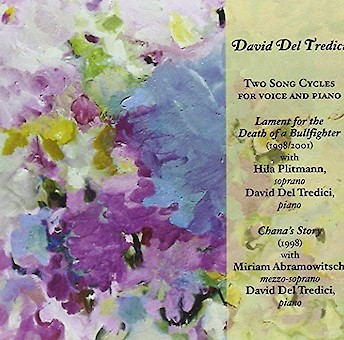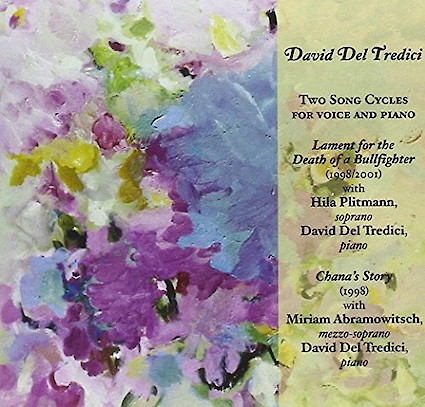One evening in 1995, at the Virginia Center for the Creative Arts, I heard the young poet Joshua Beckman read his Lament. Before long I was crying and it became clear to me that I would one day set his poem to music. Was it because I had just lost a lover to AIDS? Whatever the trigger, Beckman had touched that deep place where music longs to connect with words and to trap forever (or so composers hope) the hearts tremulous, fleeting emotion.
Beckman begins all nine sections of the poem with the same first line - "At the news of your death.' Each goes on to describe the repercussions of this 'news' throughout the world. It is a startling vision: "Children could hold back their giggling no more," "a giant wave finally reached our country and sat his big gray body down," "the computers ... went on strike and had to be replaced with people," "not a good poem was written ... not by any of the famous poets from anywhere," "every dinner no matter curried or cajun, ... came out sweeter, unbelievably sweeter," "the trees became sad ... and they decided to skip summer.' In this blend of whimsy, humor and innocent wonder, sadness enters only occasionally, as if by accident. Yet feelings of loss, like tiny droplets, do gradually accumulate. By the end, this oddly touching poetic landscape seems almost to tremble, suffused as it is now by the poet's moist heartfelt tears.
The nine sections of the poem are connected, each to the next, by music (the only exception being between the first and second songs). To mirror Beckman's repeated use of the same first line, I repeat the theme of the first song in each song that follows, though not necessarily at the beginning.
I have added titles to each of the nine sections and have reversed the order of the texts for the seventh and eighth songs.
The cycle was written in 1998 at both the MacDowell Colony and Yaddo, then revised and expanded in 2001 at the Rockefeller Foundation's Study Center in Bellagio, Italy.
"Children" (dedicated to Joanna Lee). The cycle opens with the mellifluous, filigreed theme that will be heard in each of the subsequent songs. Here, the theme is harmonized in four different ways, leading to a contrasting section in the minor and to a surprisingly bi-tonal coda.
"A Giant Wave" (dedicated to Stephen Burke) This fast boisterous song is, in the piano, a roiling sea of dotted rhythms and canonic imitation. The soprano rides this wave in declamando style.
"A Few Romances" (dedicated to Tobias Schneebaum and Joel Singer) Beginning with a quiet reminiscence of Children, this song offers refuge from the storm immediately preceding. Only towards the end, in a piano solo connecting this song to the next does the emotional temperature rise.
"Walking" (dedicated to John "Matty" Krams) This short song a chain of dominant seventh chords, "walks" along in a steadily moving quarter-note rhythm. Finally, it vanishes "and has not been heard from since," as the poem says,
"Rebellion" (dedicated to John Corigliano) This dramatic, comic scena weaves together a conglomeration of Wagner and Strauss quotes. The vocal line is stratospheric - a veritable hanging garden of soprano tendrils.
"A Good Cry" (dedicated to Tom Cipullo) An abrupt change of mood, this is the cycle's sad song. Because jazz and I have had little to do with each other, the "jazzy" feel of A Good Cry, especially in its middle section, comes as a surprise even to me.
"A Point of Contention" (dedicated to my brothers — Bobby, Richard and Peter) Fast and angry, full of unrest and shifting harmonies, this song contains a quodlibet where its main theme is combined with the idèe fixe theme of the first song
"Sweeter" (dedicated to my sister, Ann) This hushed, quiet song recitativo in style, builds suspense for the aria that will come - but not right away.
The intervening piano interlude is elaborate and virtuosic. The "failing octave" motive, which gains prominence as the motion subsides, anticipates the final song.
"David" (dedicated to myself!) In a rocking lullaby tempo, this is more aria than song rising to a grandly passionate climax amid swirls of 'trills, There is a "David" coda where the name, repeated five times, gradually dies away. The Children theme makes an appearance in its original form, but quickly diminishes to the vanishing point. A glowing piano postlude closes the cycle in high Neo-Romantic style.
Audio (9)
Recordings (1)


Two Song Cycles
2006, Music & Arts (CD 1152)Works
Performers
- Hila Plitmann, Soprano
- Miriam Abramowitsch, Mezzo-soprano
- David Del Tredici, piano